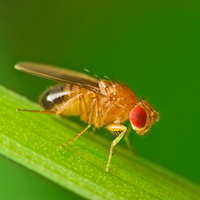
January 29, 2018 | News
January 29, 2018 – The genome of a fruit fly is strikingly similar to that of a human — so much so that scientists have been studying these tiny insects for over 100 years, in search of treatments for diseases like spinal muscular atrophy and neurological disorders. UNC geneticist and director of the Integrative Program for Biological and Genome Sciences Bob Duronio, PhD is one of those scientists. “It begins with curiosity. Curiosity about a process. And then a question about that process. And then a hypothesis that will lead to an experiment that will provide results and data to interpret. What I love about this process is that my hypotheses are often wrong. And that’s really exciting — because no human being is smart enough to understand biology at a level of molecular detail where their hypotheses are always right.”
November 27, 2017 | News, Zeisel News
November 27, 2017 – Perhaps it’s because you don’t see it on nutrition labels yet, but choline — an essential nutrient from conception through old age — tends to be tragically overlooked. According to data from the National Health and Nutrition Examination Survey, only 1 in 10 of us get enough choline, and those percentages drop among women during pregnancy — right when they need it most.
October 30, 2017 | soundbite-enews
What’s Essential for the Prenatal Brain? October 25, 2017 – An interview with Steven H. Zeisel, MD, PhD, Kenan Distinguished University Professor of Nutrition and Pediatrics, and Director, UNC Nutrition Research Institute, Kannapolis, NC. SZ: “In science, 10...
October 17, 2017 | Recipes
October 17, 2017 – The science on food and nutrients and their relationship to disease is complex, especially related to cancer. Cancer in and of itself is a complex disease that is not fully understood. As consumers, we often find ourselves inundated with the latest nutrition “story of the day” and often that story conflicts with a headline we may have seen only a week before. This simply makes trying to differentiate science and nutrition guidance more confusing. Scientists at the UNC Nutrition Research Institute (NRI) are working very hard to understand the intricacies of diet, nutrients, and their relationship to cancer prevention and progression.
September 27, 2017 | soundbite-enews
How Diet Enhances Our Natural Anti-Cancer Response One of the ways the body controls the overall number of cells is by initiating a preprogrammed cell death routine, known as apoptosis, in damaged or otherwise unnecessary cells. Apoptosis allows elimination of cells...
September 26, 2017 | News
September 28, 2017 – Many of the foods you eat are loaded with polyphenols: plant-based compounds that are anti-oxidant, anti-inflammatory and anti-infection. Polyphenols are considered non-nutritional, meaning that they help prevent disease and keep you healthy in a different way than vitamins, minerals, or other nutrients like carbohydrates, fats, and protein. David Nieman, DrPH, director of the Appalachian State University Human Performance Lab at the North Carolina Research Campus (NCRC), explains that polyphenols are a type of phytochemical, the colorful chemicals in plants that confer a variety of health benefits. “In many fruits and vegetables, all the colors that you see are the polyphenols,” he says. “That’s what you want, a lot of color in your diet.”
August 31, 2017 | soundbite-enews
The Ironies of Iron During Pregnancy Iron is listed by the American Pregnancy Association as one of the nutrients essential for healthy fetal development. Why? Because a lack of iron, a mineral naturally found in foods like meat, seafood and vegetables, directly...
June 23, 2017 | soundbite-enews
NRI Grooms Next Gen Scientists When Grant Canipe graduated from Northwest Cabarrus in 2009, he joked that he was leaving Concord and never coming back. But in an interesting twist, he did come back and is now working as a scientist at the UNC Nutrition Research...

